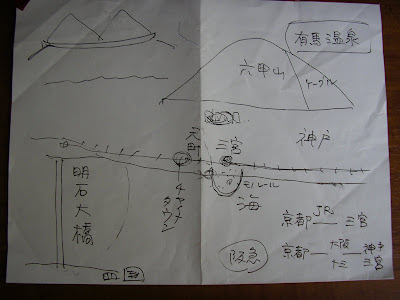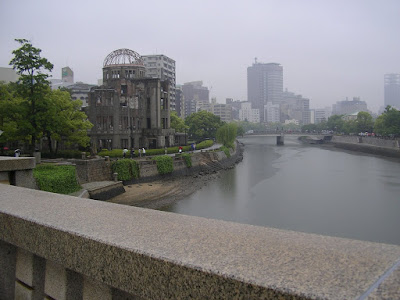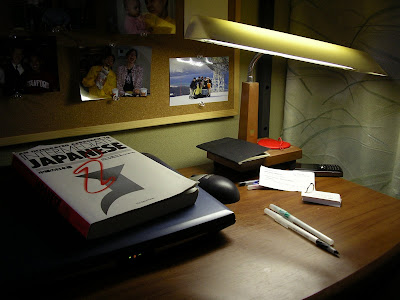I haven't been blogging for very long or very often, but today I feel I have reached a significant milestone as a blogger. Today's previous post attracted the first spam comment. I've turned on word verification for comments. Hopefully this will deter Professor Howdy and his friends.
Saturday, September 15, 2007
「日本はどう?」
Where one might ask "did you have a good time?" in English, in Japanese, the question I usually hear is a more open-ended "how was it?" My 3-year-old equivalent vocabulary seems to cover most cases well enough; I tend to stick with using "good" or "fun", sometimes throwing them both together for "goodfun", and this seems to be sufficient. But yesterday, when a coworker asked, "How was Japan?", it was not my vocabulary that made answering difficult. How can I sum up five months of exploring, traveling, studying, sightseeing, working, learning, and living in Japan? "Goodfun" just doesn't seem to do it justice. Tomorrow I will return home and although I am very much looking forward to the comfort of familiar places and people, I will miss this place and these people.
I don't think I would have it any other way.
Goodbye Japan. Thanks for all the goodfun times.
Friday, September 7, 2007
台風
For me, the typhoon has meant little more than crowded trains and some rain, but it is having more severe effects on others. Read more about the typhoon in the news.
Wednesday, September 5, 2007
More is Less
The more Japanese I learn, the less I feel like I know. For example, when I first arrived I was having trouble understanding anything spoken at a normal rate. Now, after 4 months in Japan, I am often able to group what I hear into distinct words and phrases, turning one featureless blob of sound into smaller, more manageable (although no more understandable) chunks. I can often pull out a few (typically small) chunks I can understand (usually things like 'today' or 'I think'), but with most sentences, that still leaves me with about a dozen words I don't understand. That's 12 times as many things that I don't understand!
Friday, August 10, 2007
分かる?
Friday, July 27, 2007
Perusal.
The web [kurieitazu] September edition of July 29th sale has reached. “The design part 62 which with main special edition style seat &JavaScript is expressed” “WEB chestnut thornback tar second life enrollment” giving brown machine side, the magazine rack it leaves upper. Perusal.
Thursday, July 12, 2007
Benifits of Living Alone
Wednesday, July 11, 2007
社長
Tuesday, July 10, 2007
自己紹介
Monday, July 9, 2007
First Day at KBMJ
Tuesday, July 3, 2007
Japan & Energy Reform
I have just finished my final paper for Professor MacDougall's class, Japan in Contemporary International Affairs. The paper, Japan's Quest for Energy Security: Reforms and Responses since the Oil Crises of the 1970's is available if you would like to read it. Comments are appreciated.
"An Odd Couple"
The national systems (of Japan and the United States) are extraordinarily disparate, to the point of incompatibility. Japan's penchant for explicit planning, for administrative guidance, and for collective national action could not be further from the norms and preferences of the United States.
Sharing between Japan and the United States remains a possibility primarily because it is so difficult to picture a set of events in the future that would effectively reduce the interdependence between them. Japan appears to have few options other than to live alongside the United States, even if in constant discomfiture. Except for the possibility of a sporadic unfriendly gesture, the United States is unlikely to block Japan's choice to remain in the American camp, as long as the Japanese elect to remain there. The two countries seem doomed to continue as the odd couple, sharing little in habits, values, and aspirations, yet unable to make any other choice but to accommodate themselves to one another's existence.
Raymond Vernon, Two Hungry Giants.
Saturday, June 30, 2007
Word of the Day
Yes, it's exactly what you think it is. The definition, from the OED:
A situation, or (in Logic) a syllogism, of the nature of a DILEMMA, but involving three alternatives instead of two.
I am currently working on my paper for Professor MacDougall's class and after encountering trilemma in one of my sources, I am seriously considering making an attempt to work the word into my own paper.
Wednesday, June 27, 2007
Can you hear me now?
"Thank you for using SoftBank. Your recharge account expired on 2007/06/26. You are not able to make calls. Recharge now and enjoy more our prepaid service."
Interestingly enough, in Japan, most cell phones receive calls for free, but now that my prepaid credit has expired, I can't make calls or send emails. Fortunately, recharging is just a few clicks away on SoftBank's website.
Monday, June 25, 2007
Phrase of the Day
A: Beautiful day, isn't it?
B: Yeah it is. You're up early.
A: I had some time so I repacked my backpack
B: I see. Well, I can't hike on an empty stomach so I bought some beef jerky. Want some?
A: No thanks, I'll order room service
I couldn't help smiling at the very Japanese-like English conversation, and be impressed with this woman's determination to learn English. I can only imagine what I look like when I whip out my kanji flashcards on the bus to practice for the next day's quiz.
ザーザー
Thursday, June 21, 2007
硫黄島
BBC Article
Wednesday, June 20, 2007
Don't Use Metric
Monday, June 18, 2007
Earthquakes
漢字
Wednesday, June 13, 2007
Broken
Computer
Saturday, June 9, 2007
Use Metric!
Thursday, June 7, 2007
Kyoto during World War II
I was very surprised the one time a bomb landed near my house,he said.
It was scary.
Japanese Students
I had heard that college students in Japan spend very little time studying, preferring instead to join clubs and participate in recreational activities so I was surprised with how well the Japanese students did in class. Part of our classwork included small presentations; the auditors' presentations were interesting, sophisticated, and at least as good (if not better) than most of the ones given by those of us who were actually taking the class for a grade, even more impressive considering everything was in English. Certainly it seems that Japanese schools are doing something right, especially if they can do so well in a class while studying so little, but I also suspect the caricaturization of Japanese college students as idle and not hardworking is probably not correct.
Monday, June 4, 2007
Birds of a Feather...
Saturday, June 2, 2007
Takigi Noh
Occurring only once per year, Takigi Noh is a special performance of the ancient Japanese Noh theater. Kyoto's Heian Shrine serves as a magnificent backdrop for the evening's dramatic performance, drawing a crowd of several thousand. Because Otousan and I arrived over 3 hours early, we were able to get excellent seats in the 2nd row, but even with an hour to wait before the performance began, all available seating and standing room had quickly filled up. This did not stop the continual announcements requesting that we please take up as little space as possible
as more people continued to squeeze into the shrine.

Although it was crowded, the weather could not have been more perfect. Pleasantly warm with a refreshingly cool breeze, everyone relaxed, chatting with each other in anticipation of the show. Many people had brought a bento to snack on during the wait. As the sun began to go down, Shinto priests set on fire three large piles of firewood and several smaller braziers surrounding the stage, continuing to refuel them throughout the night to provide lighting for the performance.

Developed in ancient times by courtiers and performed by the cultural high class of Japan, Noh is known for it's attention to minute detail and subtlety; the slightest reach of a hand, turning of the head, or movement of the body is almost always significant. However, the plots were not overly complicated and armed with my English summaries, I was able to follow along quite easily. The Takigi Noh performance is composed of a set of plays separated by short intermissions. Traditionally, one of the intermissions is filled with Kyogen, a comedic and less stylized theatrical art form. This night was no exception. The Kyogen story revolved around a servant whose master had sent him on an errand to deliver sake. The servant encountered and old friend who managed to convince him to drink the sake instead. Both men became drunk and hilarity ensued.
The Kyogen was amusing, but the final Noh performance was perhaps the most exciting. The story, set in China, revolved around three lions who guarded an ancient and special bridge. The lions, dressed in fantastically ornate costumes and masks (the original suGOku kirei
), ran and jumped fiercely around the stage, sometimes frantic with sudden gestures and movements, stomping on the floor for emphasis. At the peak of story, as the 12-man chorus reached it's loudest volume yet and the complex rhythms of the Otsuzumi and Kotsuzumi drums rang out into the night air, with the firelight dancing across the stage, one of the actors (in full lion-kimono regalia) did a standing backflip over one of the other actors. It was a suitably dramatic ending for a night whose atmosphere of excitement and enjoyment was unforgettable.

Otousan's Map of Kobe

Needless to say, we weren't able to make it to all those places in just the few hours we had after our field trip finished, but we enjoyed strolling through China Town (all of one small block) and eating items purchased from shops along the street.
Friday, June 1, 2007
Wednesday, May 30, 2007
Fushimi Inari
Tuesday, May 29, 2007
Technical Difficulties
Yes, that's correct, the Intel Pentium 4 processor in this computer, which is capable of running at 2.4GHz, has slowed down to a crawl, puttering along at a measly 0.31GHz. Great. This computer would be state-of-the-art in, oh, 1998. Of course, the computer still turns on, but since the processor is so slow (it can't even keep up with my typing -- I have to periodically pause to let it catch up), everything actually takes 8 times as long. That doesn't seem too bad, I suppose. Let's see, quick estimate... I should be able to get everything I was planning to do in the next 4 months done by about, uhm, 2011.
Hoping this was a software problem, I downloaded the latest drivers and utility updates from Toshiba. Installation went smoothly, but after rebooting, I was faced with the following message.
Fantastic. The computer I brought to Japan, which is not even mine (my laptop broke the day before I left; on such short notice I was fortunate enough to be able to bring my dad's), basically doesn't work and there appears to be no way for me to fix it.
Someday I will have a computer that actually works. Until then, this blog is officially on hiatus.
Saturday, May 26, 2007
宮島

Miyajima is somewhat far from Kyoto (a couple of hours by Shinkansen), but thanks to the generous contributions of the Bing family, our whole program was able to visit Hiroshima and Miyajima and see the great torii. Other highlights from the trip included enjoying a meal of Hiroshima style Okonomiyaki, a sobering trip to Hiroshima Peace Memorial Park, our delicious Bing dinner, hiking up our yukata to slosh through through the mud and water at 10PM so we could pose for pictures under the great torii (only possible at low tide), and spending most of Saturday climbing Mt. Misen — we went all the way to the top of the island.
Friday, May 25, 2007
広島
Monday, May 21, 2007
Big or Small — You Decide!

Saturday, May 19, 2007
Fountain Hopping
Monday, May 14, 2007
Sunday, May 13, 2007
三十三間堂
Saturday, May 12, 2007
Friday, May 11, 2007
East and West
Thursday, May 10, 2007
Deliciously?
Sometimes I wonder about word translations. The following word makes perfect sense, except for the sense of it meaning 'deliciously'. Can someone tell me how to use that in a sentence?
Monday, May 7, 2007
There's a reason it's called "studying abroad".
Sunday, April 29, 2007
Overheard in Kyoto
Thursday, April 26, 2007
日本語
Tuesday, April 24, 2007
よかった日
Rice
Juice
Monday, April 23, 2007
Saturday, April 21, 2007
賀茂川

Friday, April 20, 2007
Customs Inspections
Jackets
Monday, April 16, 2007
Mailing Address
Stanford Program in Kyoto
Doshisha University
Karasuma Higashi-iru, Imadegawa-dori
Kamigyo-ku, Kyoto 602-8580
JAPAN

















